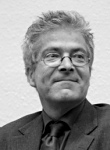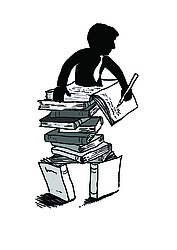
- Robert Stockhammer (Ludwig-Maximilians-Universität München)
COUNTABLE NATIONS, UNCOUNTABLE LANGUAGES. “HAUBTSPRACHE” (MAIN LANGUAGE) AND DIALECTS IN THE 17TH CENTURY
Nations are items relying on and/or enabling a clear-cut distinction between domestic and foreign policy (politique intérieure vs. extérieure). Even, and especially, with regard to their mutual relationship, as potential members of the ‘United Nations’, they are essentialy countable items.
As philological – i.e., literally, ‘language-loving’ – items, nations depend on the assignment of languages to their territories. Ideally, a one-to-one assignment is assumed – Italians speak Italian, French people French, Rwandians Kinyarwanda –, but even in those cases (far from being rare) that deviate form this rule, it seems necessary and possible to fix a small definite number, as, for example, the famous 'four' in the case of Switzerland.
The possibility of this assignment clashes with the philological insight into the fact that languages are not countable. One does not have to quote Jacques Derrida (“Il est impossible de compter les langues”); the same admission can even be found in the founding, albeit distorted, text of ‘structuralism’, in Ferdinand de Saussures Cours de linguistique générale, which includes reflections on phenomena as, for example, Dutch being linguistically much closer to idioms classified as German dialects than these are to other idioms also classified as German dialects.
Moreover, about 600 years earlier, the observation that the inhabitants of one neighborhood in Bologna speak differently from those of another neighborhood in the same town is at the core of Dante's De vulgari eloquentia, a seminal text for the search for – or invention of – vernaculars. Even while this program belongs to the ‘pre-history’ of nation-building only, it already raises a bundle of questions which will be repeatedly tackled in the longue durée of nation-building as the construction of communities united by the love of the same language.
The concept of ‘mother tongue’ – already present as lingua materna in Dante, but much more emphasized as Muttersprache by Herder and others – plays an important role for these the-same-language-loving communities. Since, however, mothers – even within the same nation –do obviously not speak completely identical languages, language politics does not only have to deal with the diversity of supposedly countable ‘languages’, but also with the varieties of uncountable ‘dialects’. National philologies rely, in other words, on a distinction between their exterior politics (in dealing with the external very-other) and their interior politics (in dealing with the internal somehow-same/somehow-other); and the most important linguistic tool for providing this dichotomy is the distinction between ‘language’ and ‘dialect’. The history of linguistics – understood as a reflection on language as well as a means of language politics – oscillates between the insight into the uncountability of languages and the need for its countability.
As a spot check, my paper will investigate the early ‘post-Westphalian’ stage of this oscillation, crystallized in Justus Georg Schottelius’ two-volume enterprise Ausführliche Arbeit Von der Teutschen HaubtSprache (1663). Schottelius’ program is heavily dependent on a clear-cut distinction between ‘languages’ and ‘dialects’. The project of establishing German as a ‘main language’ between others entail strategems of appropriation or rejection not only of ‘foreign’ words, but also of provincialism from the ‘own’ territory – especially as the ‘main language’, in the Dantean tradition, is conceived as an idiom not to be identified with any of the existing dialects, not even the ‘High German’ (a word whose ambiguity – ‘high’ comprising geographical as well as social meaning – is exploited deliberately). As Schottelius makes ample use of Conrad Gesner’s famous collection of languages (Mithridates, subtitled De differentiis linguarum tum veterum tum quae hodie apud diversas nationes in toto orbe terrarum in usu sunt, from 1555), the way he re-interprets the data taken from Gesner is significant for his interest in sharpening the distinction of ‘language’ and ‘dialect’.

Universität Wien
Spitalgasse 2, Hof 3
1090 Wien
T: +43-1-4277-428 01 / +43-1-4277-428 91
F: +43-1-4277-9 428




